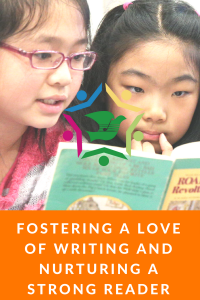By Staci Mathura, Language Arts Instructor
In the book The Magical Child, author Joseph Pearce explains “The child can never learn to play without the parent playing with the child. Play … is a huge creative potential built within the child, which never develops unless it is stimulated by the adult model, the parent.
I’ll tell you a secret, I was not always fond of reading!
That is almost sacrilegious coming from an English Professor, instructor and researcher, but it is the truth. Over time I had to learn to become a lover of books, and appreciate them for enjoyment rather than for rote information. Thankfully my parents always had books, magazines and newspapers around the house for us to read so there was no excuse to say “I’m bored.” I would choose a story for my parents to read to before bed, and on our way to school I would read the newspaper aloud to my mom as she drove. Sometimes at school I would shock my teachers with my advanced vocabulary from reading these materials. At the dinner table my family would discuss current headlines or literary topics, which engaged me further in world news.
My mother worked across the street from the New York City Pubic Library, where she got me my own library card as soon as I was old enough. In my teens I would spend an hour or so there while I waited for her, after my classes and after-school activities. In this time I began to explore the library, talk to the librarians about various genres and quickly I realized that I loved being there so much that working in the library became my first ever summer job. Soon enough I began to develop writing skills that I would eventually use a cathartic device in my private journals and ultimately in college, and now in writing my dissertation.
As an educator of over twelve years, I know personally that teachers are under immense pressure from districts to cover a stringent curriculum, raise test scores and produce college ready learners. While this is necessary for academic purposes, systematic rigor of the general curriculum leaves little room for stimulating a child’s creativity. However a love of reading and written expression can easily be nurtured at home, which thus creates healthy study habits and lifelong skills. Similar to the personal examples I’ve shared above, there are simple reading and writing engagement practices that can be fun for parents and students alike that will have a lifelong impact on the learner. Parents are immense assets to learning and the key to stimulating the child’s creative potential outside of school.
If you are a parent who’s child struggles with writing and reading at home, these are just a few ways you can integrate these necessary skills into fun activities that you can experience together. Most importantly, parents are the ultimate role model and learning coach who can encourage a child’s imagination and spark their written communication of those ideas.
Journals, Scrap books or Chromebooks
Pick a medium that your kid enjoys using the most and have them paste fun pictures, doodles and illustrations as they write. Start with a brief sentence about their day or a fun writing prompt and incrementally increase the amount of writing every week.
Make it a game and not a chore
Pick books to read and topics to discuss that your child enjoys. Whether its about daily activities, dinosaurs, sports or movies, your kid has an interest and an opinion to share. Talk through the ideas, ask questions and listen to their answers and opinion. Time them to see how much they can ‘free write’ in their journals
Curate a robust lexicon
Build a strong vocabulary! Have your child record a new word they learned every week in their journal. Maybe practice using it in a sentence, or implement it into their weekly writing. This will have a profound impact on raising reading levels.
Designate writing time and reading time
Whether it’s a few times a week before breakfast or before bedtime, carve out a space for reading and written expression. One good method is to time your child and see how much they can accomplish.
Reading or Creative writing nook
Most kids have a space where homework and tasks are completed. However have them pick a comfortable space, grab a snack and allow them to read and write in a where they feel at ease. Don’t you love curling up with a book on the couch or in bed? Your kid has a favorite spot where they can tap into their creative potential!
Your kid is hilarious, witty, sarcastic…
Let your child naturally develop their writing ‘voice’ or tone. Many of my students are admittedly hilarious and keep me laughing with their natural comedic sense. Soon you will see their unique personality reflected in their writing style.
Be a connoisseur not a critic
We know you are your child’s biggest fan! Journals are known to be private, so don’t force them to reveal their inner musings. But if your child chooses to share written creations with you, make sure to give lots of praise and encouragement. Ask enthusiastic questions to convey your engagement in their topic and don’t be critical about their grammar.
As an educator and now an enrichment instructor, there is so much I can do to academically serve the needs of my students. Remember parents, you are the critical element in assisting your child’s development of strong reading habits and for nurturing written expression skills outside of the classroom walls. You play a pivotal part of cultivating their love of reading and writing, so please encourage your child to pick up a book and a pencil and let those creative ideas flow!

